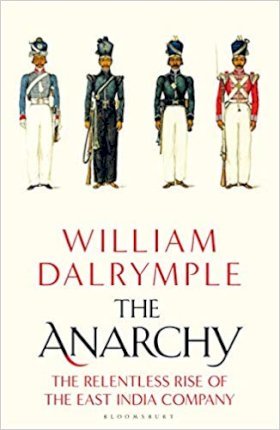

Dalrymple, however, nods to scholarship that has replaced this myth of an Indian “Dark Age” with a narrative of rising regional powers shrewdly maintaining continuities with Mughal practice. Initially, “anarchy” refers to India’s condition following the death of the Mughal emperor Aurangzeb in 1707. The book’s framing concept of “anarchy” further stretches the gap between premise and narrative.

By the end, Dalrymple is forced to change key, reflecting on the company’s “gradual penetration,” how it “slowly appropriated the power of the mighty Mughal Empire.” The company’s turtle pace is even more apparent when we recall that its quest for substantive access to India dated from the 17th century. This was nothing like Napoleon’s lightening conquest of Europe. Dalrymple’s prosecution of the Company as the villain of colonialism is premised on the “astonishing” rapidity of its achievement, “swiftly” subduing a subcontinent in “less than half a century.” But his patient account of its ferociously resisted half-century struggle dispels any sense of astonishing progress. In postwar Calcutta, mansions rise “jagged from the loot-littered riverfront like blackened, shattered teeth from a diseased gum.” These gems are enrolled in an account of the conquest of India as “the most extraordinary corporate takeover in history.”Ĭorporate greed is certainly a compelling target but requires some logical acrobatics. (I only wish the poetry laced throughout had also been presented in the original languages.) Delightful passages abound, including of the duel between Warren Hastings and Philip Francis, Shah Alam as “the sightless ruler of a largely illusory empire,” and action-packed scenes of battle.


Still, Dalrymple’s literary commitments and tight focus on the Company constrain it from grappling fully with the realities of colonialism.ĭrawing richly from sources in multiple languages, The Anarchy is gorgeously adorned with luminous images representing a range of perspectives. And no one can argue that Company rule was just, benevolent, or about anything other than greed. No one can now argue that Indians did not put up a tough fight that they lacked in enterprise, dignity, or political sophistication that the Mughals - the empire that ruled much of the subcontinent before the British - were a decrepit dynasty that let the British have their way. THE ANARCHY, William Dalrymple's gripping book on the East India Company's "relentless rise" in the Indian subcontinent from 1756 to 1803, settles many things.



 0 kommentar(er)
0 kommentar(er)
